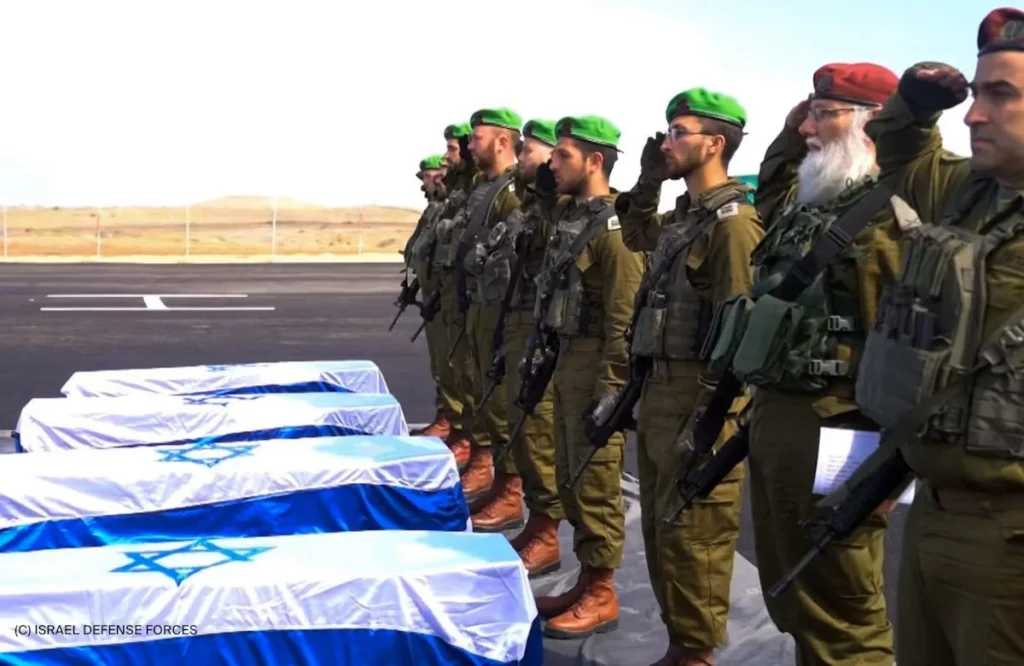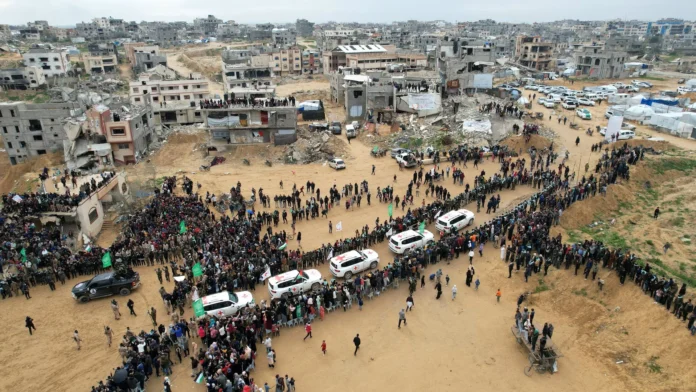Introduction
The ongoing Israel-Hamas conflict witnessed another tragic chapter as Hamas returned the bodies of four Israeli hostages. Among them were the youngest captives, Kfir and Ariel Bibas. However, the anticipated return of their mother, Shiri Bibas, did not materialize, leaving the nation in anguish. This unexpected turn of events has further fueled tensions and deepened the emotional toll on their family and the broader Israeli public.
A Shocking Discovery
Hamas paraded four black caskets against a backdrop of propaganda, intensifying the emotional turmoil. The handover, conducted in the southern Gaza city of Khan Younis, drew large crowds as armed Hamas militants oversaw the proceedings. Each casket bore a photograph of the deceased, underscoring the personal loss suffered by their families. The highly publicized nature of the event not only added to the grief of the affected families but also sent a strong political message from Hamas, demonstrating their leverage in ongoing negotiations.
The Missing Mother
While Israeli authorities confirmed that the bodies of Kfir and Ariel Bibas were included in the transfer, the body initially believed to be that of their mother, Shiri, was later identified as someone else. This discrepancy has been termed a serious violation by Hamas, which was expected to return four hostages under the ceasefire agreement. The uncertainty surrounding Shiri’s whereabouts has raised significant concerns over the integrity of future agreements and has left her loved ones desperate for answers.
“We demand that Hamas return Shiri home along with all of our abductees,” the Israel Defense Forces (IDF) declared in an official statement.
The unexpected revelation has prompted Israeli officials to reevaluate their approach to hostage negotiations, ensuring that similar mishaps are avoided in future exchanges.
The Fate of the Bibas Family
The Bibas family was abducted in October 2023 during an attack on their kibbutz, Nir Oz. While other child hostages were released in November, Kfir and Ariel were never freed. Hamas had previously claimed that Shiri and her children were killed in an Israeli airstrike, a claim Israel initially could not verify. The latest revelation only deepens the uncertainty surrounding Shiri Bibas’ fate. Given Hamas’ history of misinformation, Israeli authorities remain cautious in drawing conclusions, emphasizing the importance of thorough investigations into hostage situations.

A Painful Confirmation
The IDF confirmed that Kfir and Ariel were brutally murdered in captivity in November 2023. The family, along with the rest of Israel, has been grappling with this painful truth. Their father, Yarden Bibas, was released on February 1, but his wife and children never emerged from Gaza. As more details come to light, the tragedy continues to unfold, leaving the Israeli public heartbroken and seeking justice for the victims.
Reports indicate that international humanitarian organizations are closely monitoring the situation, pushing for transparency and accountability in future ceasefire negotiations. The fate of other missing individuals remains a pressing issue, one that both Israeli and global leaders are keen to address.
The Ceasefire and Its Implications
The return of the hostages’ remains marked the first such exchange under the current ceasefire deal. While this agreement also includes the planned release of six living captives, including Eliya Cohen and Omer Shem Tov, the uncertainty surrounding those still held in Gaza continues to haunt Israeli families. As negotiations for the next phase of the ceasefire unfold, the stakes remain incredibly high.
Humanitarian organizations and diplomatic mediators have been urging both sides to ensure the safe return of remaining hostages while addressing broader security concerns. The balance between securing captives and maintaining national security remains a difficult challenge for Israeli authorities.
A Nation in Mourning
Israeli Prime Minister Benjamin Netanyahu addressed the nation, expressing grief over the loss.
“We bow our heads for the heavy loss of our four hostages,” he stated, vowing to bring home the remaining captives and continue military operations against Hamas.
The Hostages and Missing Families Forum echoed these sentiments, highlighting the deep emotional toll on the families affected by these tragic events. Their continued advocacy aims to keep the spotlight on the plight of remaining captives and ensure their safe return.
The Israeli public remains deeply divided over the ongoing conflict, with some advocating for a more aggressive military response while others push for a stronger diplomatic approach. The emotional weight of the hostage crisis has only intensified debates surrounding Israel’s future policies and strategy in the region.
Looking Ahead
As negotiations continue for the next phase of the ceasefire deal, efforts remain focused on securing the release of the remaining 64 hostages. The Israeli government is committed to ensuring their safe return while also addressing the broader post-war administration of Gaza. The challenge remains in striking a balance between military operations, diplomatic efforts, and humanitarian considerations.
The uncertainty surrounding Shiri Bibas’ whereabouts adds another layer of distress to an already heart-wrenching situation. Until definitive answers are provided, the journey for her family and the entire nation remains far from over.
Experts suggest that ongoing diplomatic efforts will need to intensify in the coming weeks, with involvement from international mediators to ensure fair and effective negotiations. The hope remains that further ceasefire agreements will facilitate the safe return of remaining hostages and pave the way for long-term regional stability.
With the entire nation watching, every development in the hostage crisis carries immense significance. The fate of the Bibas family and other hostages serves as a stark reminder of the human cost of conflict, reinforcing the urgency for resolutions that prioritize both security and humanity.


